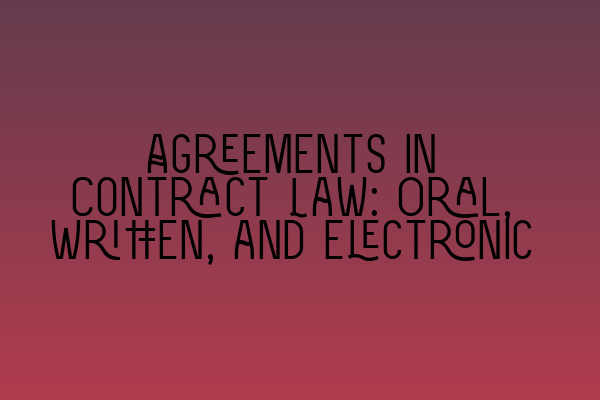Agreements in Contract Law: Oral, Written, and Electronic
In the world of contract law, agreements play a vital role in establishing the terms and conditions of a legally binding arrangement between parties. These agreements can be made through various means, including oral, written, and electronic communication. Each of these forms of agreement carries its own set of advantages and disadvantages, which we will explore in this blog post.
1. Oral Agreements:
Oral agreements, also known as verbal agreements, are contracts that are made through spoken words and do not require written documentation. While oral agreements are legally binding in many jurisdictions, they can be more challenging to enforce and prove in court compared to written agreements. However, in certain situations, oral agreements can be just as valid and enforceable as written contracts.
For example, in cases where immediate action is required, such as a situation where parties need to enter into a contract on the spot, oral agreements can be highly valuable. Moreover, oral agreements are common in everyday life, such as when making purchases from a store or engaging in casual agreements with friends or acquaintances.
Despite their potential enforceability, it is always advisable to have important agreements in writing to avoid potential misunderstandings and disputes. Written contracts provide clear documentation of the terms and conditions agreed upon by parties and can serve as valuable evidence in case of a legal dispute.
2. Written Agreements:
Written agreements are contracts that are formalized through written documentation, often prepared in the form of a contract or agreement. These contracts outline the terms and obligations of the parties involved and provide a detailed record of the agreed-upon terms. Written agreements offer a higher level of certainty and can be easier to prove and enforce compared to oral agreements.
When preparing a written agreement, it is crucial to ensure that all essential terms are clearly stated and agreed upon by all parties involved. This includes details such as the identities of the parties, the subject matter of the agreement, the consideration or payment involved, and any other relevant terms and conditions.
Additionally, written agreements provide an opportunity for parties to include specific clauses and provisions to protect their interests. These clauses can cover areas such as dispute resolution mechanisms, termination rights, and confidentiality obligations. By including such provisions, parties can avoid potential conflicts and mitigate risks associated with the agreement.
3. Electronic Agreements:
With the advancement of technology, electronic communications have become a widely used means of entering into contracts. Electronic agreements, also known as e-contracts or digital contracts, are formed through electronic means, such as email exchanges, online forms, or electronic signatures.
Electronic agreements offer several benefits, including convenience, speed, and cost-effectiveness. They allow parties to enter into contracts from anywhere in the world, eliminating the need for physical presence or paper documentation. Moreover, electronic agreements can be easily saved, shared, and accessed electronically, making them highly efficient.
To ensure the validity and enforceability of electronic agreements, various laws and regulations have been introduced to govern their use. For instance, in many jurisdictions, electronic signatures are considered legally binding and carry the same weight as traditional handwritten signatures. These regulations aim to provide a secure and reliable environment for electronic transactions while protecting the rights and interests of the parties involved.
In conclusion, agreements form the basis of contract law and establish the rights and responsibilities of parties in a legally binding relationship. Whether made orally, in writing, or electronically, each form of agreement offers its own set of advantages and considerations. While oral agreements can be quick and convenient, written agreements provide clarity and enforceability. Electronic agreements, on the other hand, offer convenience, efficiency, and are increasingly recognized under the law.
Regardless of the form of agreement chosen, it is essential to understand the legal requirements and implications associated with each. Seeking professional legal advice and guidance is always recommended to ensure compliance with relevant laws and regulations.
If you’re interested in learning more about contract law and preparing for the SQE exams, check out our related articles:
– SQE 1 Practice Exam Questions
– SQE 1 Practice Mocks FLK1 FLK2
– SQE 2 Preparation Courses
– SQE 1 Preparation Courses
– SRA SQE Exam Dates
By staying informed and well-prepared, you can confidently navigate the complexities of contract law and excel in your legal career.
